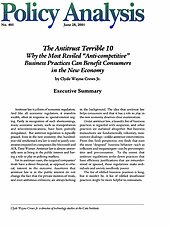Yet in antitrust cases, the targeted companies’ rivals have a direct financial, as opposed to ethical, interest in the outcome. Assertions that antitrust law is in the public interest do not change the fact that the private motives of rivals, and even ambitious enforcers, are always lurking in the background. The idea that antitrust law helps consumers and that it has a role to play in the new economy deserves close examination.
Under antitrust law, a laundry list of business practices is regarded with suspicion, and other practices are outlawed altogether. But business transactions are fundamentally voluntary, non-coercive dealings–unlike antitrust interventions. From this fresh perspective, one finds that even the most “despised” business behavior–such as collusion and megamergers–can be pro-competitive and pro-consumer. To the extent that antitrust regulations strike down practices that have efficiency justifications that are misunderstood or ignored, those regulations make individuals and society needlessly poorer.
The list of vilified business practices is long, but it needn’t be. A list of vilified trustbuster practices might be more helpful to consumers.

